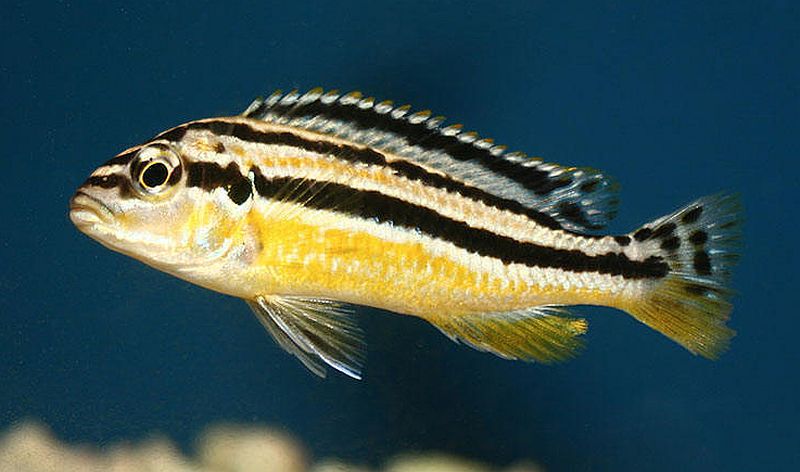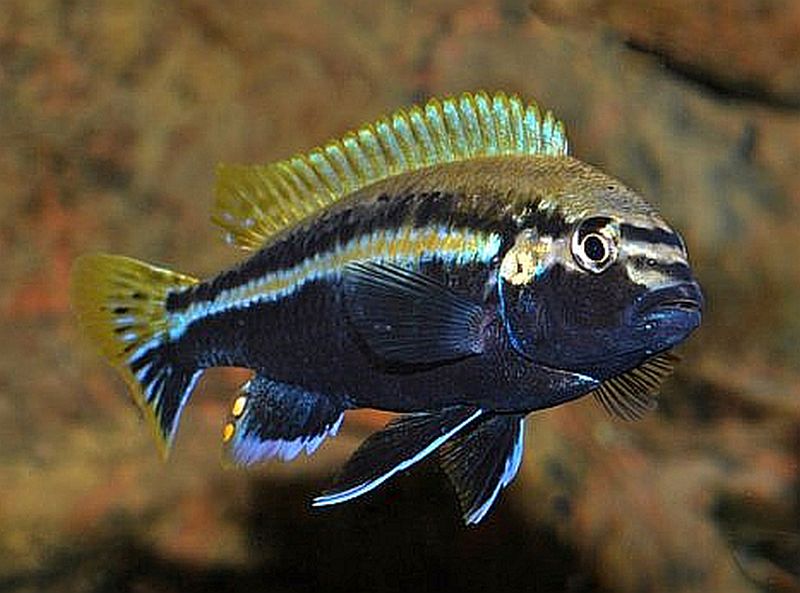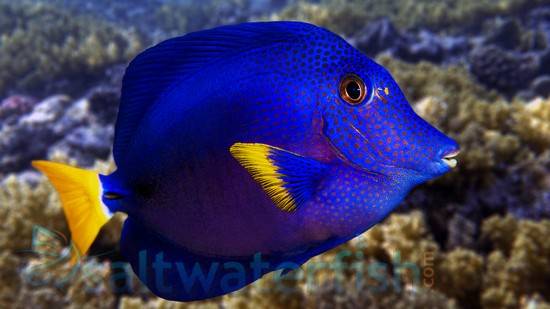The Golden Mbuna (Melanochromis auratus) is also known by tropical fish keeping enthusiasts as the Malawi Golden Chiclid, Auratus Chiclid, Golden Cichlid and Golden Pseudotropheus.
Golden Mbuna are endemic to the rocky shorelines of Lake Malawi in Africa. They occupy the rocky areas of the southern part of the lake from Jalo Reef, to the north of Nkhota Kota, and south along the western coast to Crocodile Rocks. They are noticeably absent from the eastern shore of the lake.
The Golden Mbuna is an elongated species with a rounded snout, a narrow mouth, and a continuous dorsal fin. They have closely spaced incisor like teeth that in their natural environment are used to feed on aufwuchs. Like all cichlids, they have spiny rays in the rear parts of their dorsal, pectoral, anal and pelvic fins.
Male Golden Mbunas are colored very differently than the females. Their backs are a golden to faded yellow and the rest of their body is black. Their dorsal fins are almost a transparent yellow with black specks that almost form a horizontal line through the top. A narrow yellow line outlined in neon blue runs from the gill area to the caudal fin through the middle of their body and their tail fins are black edged with yellow. Their pelvic and anal fins are black trimmed in neon blue.
Female Golden Mbunas are gold colored with a black dorsal fin that is edged in gold. Except for their black back, the rest of their body is a golden color. They also have a black line that runs from just behind the eye to the caudal fin that is trimmed in white to blue. The rest of their fins are golden except for the tail fin which is white with black spots on the upper portion, and gold on the bottom.
Juveniles up to about 6 months have a golden belly with a white upper body and three horizontal black stripes down the middle, along the back, and one through the top of the dorsal fin.
Generally the males have gold and neon blue stripes over a black background, and females have black and neon blue stripes over a golden background.
The streams that flow into Lake Malawi have a high mineral content which along with evaporation in the lake results in very hard, alkaline water.
In an aquarium environment, this chemistry can be maintained by providing a crushed coral and aragonite sand substrate to increase water hardness and plenty of rocks in the tank for the fish to hide among. They need a powerhead in their tank to provide moderate water movement, a strong efficient filtration system, and regular weekly water changes to mimic the clear, clear water conditions that they are found in.
Because Golden Mbunas are extremely territorial and aggressive, a tank of at least 55 gallons loaded up with plenty of rocks arranged to form passageways, caves, etc. is recommended. Arranging the rocks in separate, distinct piles will aid in keeping them in their own territory and reduce aggression. Do not load up a tank of Golden Mbunas with live plants as they will quickly become food for the fish.
Golden Mbunas are obviously not good candidates for a community aquarium. They do best in a species specific tank but should not be housed with other peaceful cichlids. These fish are so aggressive that they will attack other species of Mbunas that are similar in shape or color and even similar looking males of other species. The best way to house these cichlids is to keep them in small groups of a single male and several females. When kept in smaller tanks, the male will attack and kill any other male in the tank and sometimes even females. In this scenario, the dominant female has also been known to kill subordinate males.
Keeping Mbunas in a tank of 120 gallons or even more will help to minimize aggression.
The Golden Mbuna is a maternal mouth brooder that is polygamous by nature, with a single male attending to several females. They have been bred in captivity and like other Mbunas, will spawn in the male’s territory.
During spawning, the males colors become intensely exaggerated. The female will lay about 40 eggs which she immediately takes into her mouth. She then stimulates the male by mouthing his vent until he discharges a cloud of milt into the water. She then inhales the cloud of milt which fertilizes the eggs held in her mouth. At a temperature of 82°, the eggs will hatch in about 21 days and the fry are guarded by the female for several more days until they are able to fend for themselves.
Feed the fry baby brine shrimp or finely crushed carnivore flake food. The fry will reach 1″ in length within 3 months, and males will begin to display their colors between 6 and 9 months.
The more rocks, caves, crevices and passageways you have in your breeding tank, the better the chances are for survival of the fry.
Adult Golden Mbuna are omnivores but in their natural environment have a very herbivorous diet. They will quickly eat any plant you place in their tank. Feed them several small portions of fresh, dry, frozen, or freeze dried meals of Spirulina, bloodworms, brine shrimp or other foods rich in vegetable matter to keep their colors at an optimum level. Foods like beef heart or chopped worms can encourage digestive problems and should be avoided.
Golden Mubna can be anywhere from 1 1/4″ to 3 1/2″ when available for purchase.
Minimum Tank Size: 55 gallons
Care Level:
Temperament: Highly Aggressive
Aquarium Hardiness: Moderately Hardy
Water Conditions: 73 – 82° F, pH 7.8 – 8.6, dGH 6 – 10
Max. Size: 5”
Color Form: Black, White
Diet: Omnivore
Compatibility: Suitable for a species tank
Origin: Jalo reef to Crockodile Rock in Lake Malawi
Family: Characidae
Lifespan: 5 years
Aquarist Experience Level: Intermediate




